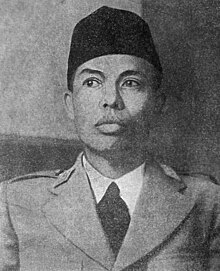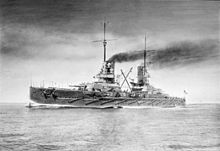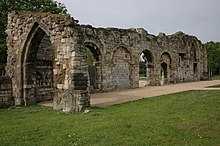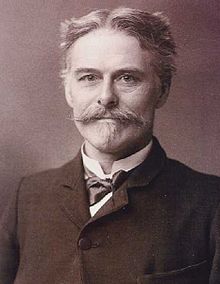Portal:History
The History Portal

Historia by Nikolaos Gyzis
History (derived from Ancient Greek ἱστορία (historía) 'inquiry; knowledge acquired by investigation') is the systematic study and documentation of the human past. History is an academic discipline that uses a narrative to describe, examine, question, and analyse past events, and investigate their patterns of cause and effect. Historians debate which narrative best explains an event, as well as the significance of different causes and effects. Historians debate the nature of history as an end in itself, and its usefulness in giving perspective on the problems of the present.
The period of events before the invention of writing systems is considered prehistory. "History" is an umbrella term comprising past events as well as the memory, discovery, collection, organization, presentation, and interpretation of these events. Historians seek knowledge of the past using historical sources such as written documents, oral accounts or traditional oral histories, art and material artefacts, and ecological markers.
Stories common to a particular culture, but not supported by external sources (such as the tales surrounding King Arthur), are usually classified as cultural heritage or legends. History differs from myth in that it is supported by verifiable evidence. However, ancient cultural influences have helped create variant interpretations of the nature of history, which have evolved over the centuries and continue to change today. The modern study of history is wide-ranging, and includes the study of specific regions and certain topical or thematic elements of historical investigation. History is taught as a part of primary and secondary education, and the academic study of history is a major discipline in universities.
Herodotus, a 5th-century BCE Greek historian, is often considered the "father of history", as one of the first historians in the Western tradition, though he has been criticized as the "father of lies". Along with his contemporary Thucydides, he helped form the foundations for the modern study of past events and societies. Their works continue to be read today, and the gap between the culture-focused Herodotus and the military-focused Thucydides remains a point of contention or approach in modern historical writing. In East Asia a state chronicle, the Spring and Autumn Annals, was reputed to date from as early as 722 BCE, though only 2nd-century BCE texts have survived. The title "father of history" has also been attributed, in their respective societies, to Sima Qian, Ibn Khaldun, and Kenneth Dike. (Full article...)
Featured picture
Did you know (auto generated)

- ... that the historical lands and fishing grounds of the Skinpah were buried underwater by the construction of The Dalles Dam?
- ... that the Lord Chamberlain's plays are a historical archive of play scripts curated through theatrical censorship that provide a unique insight into attitudes to race and sexuality?
- ... that officials said this year's Louisiana wildfire season includes the largest wildfire in the state's history?
- ... that in 88 BC, Lucius Cornelius Sulla carried out the first coup d'état in Roman history?
- ... that the Netflix-released film A House in Jerusalem is inspired by the history of the director's Palestinian family, who were expelled in 1948 from what had become Israel during the Nakba?
- ... that actor Oscar Isaac contributed to the creation of his character's background history in the film A Most Violent Year (2014)?
Edward Drinker Cope (July 28, 1840 – April 12, 1897) was an American zoologist, paleontologist, comparative anatomist, herpetologist, and ichthyologist. Born to a wealthy Quaker family, he distinguished himself as a child prodigy interested in science, publishing his first scientific paper at the age of 19. Though his father tried to raise Cope as a gentleman farmer, he eventually acquiesced to his son's scientific aspirations.
Cope had little formal scientific training, and he eschewed a teaching position for field work. He made regular trips to the American West, prospecting in the 1870s and 1880s, often as a member of U.S. Geological Survey teams. A personal feud between Cope and paleontologist Othniel Charles Marsh led to a period of intense fossil-finding competition now known as the Bone Wars. Cope's financial fortunes soured after failed mining ventures in the 1880s, forcing him to sell off much of his fossil collection. He experienced a resurgence in his career toward the end of his life before dying on April 12, 1897. (Full article...)
On this day
- 945 – The brothers Stephen and Constantine Lekapenos, having deposed their father as Byzantine emperor a few weeks earlier, were themselves overthrown by Constantine VII, their co-emperor.
- 1825 – On the advice of John C. Calhoun, President James Monroe asked Congress to organize Indian Territory (map pictured) west of the Mississippi River, laying the groundwork for Indian removal in the United States.
- 1869 – Former members of the overthrown Tokugawa shogunate proclaimed Japan's second-largest island, Hokkaido, to be the independent Republic of Ezo.
- 1945 – The Soviet Red Army liberated about 7,000 prisoners left behind by the Nazis in Auschwitz concentration camp.
- 2010 – Porfirio Lobo Sosa became the new president of Honduras, ending a constitutional crisis that had begun in 2009 when Manuel Zelaya was forcibly removed from office.
- Angela Merici (d. 1540)
- John Perkins (d. 1812)
- Perfecto Yasay Jr. (b. 1947)
- Zelda Rubinstein (d. 2010)
Selected quote
Even death is not to be feared by one who has lived wisely.
— Gautama Buddha, founder of Buddhism
Related portals
More Did you know...
- ... that the Soviet Tupolev Tu-142 (pictured) maritime patrol aircraft was developed in response to the American UGM-27 Polaris submarine-launched ballistic missile?
- ... that Harry Powers said that watching his victims die was more fun than a brothel?
- ... that the effort put forth by the subject of Miró's 1937 Naked woman climbing a staircase and her heavy limbs are thought to reflect the tragedy of the Spanish Civil War?
- ... that 49% of German military losses happened in the last 10 months of the Second World War in Europe?
- ... that Thomas Edison lost a fortune in his ore-milling company, but "had a hell of a good time spending it"?
- ... that American McCaull Comic Opera Company actress May Yohé, once the owner of the Hope Diamond, died poor?
- ... that Egyptian political cartoonist Ahmad Nady took part in the 2011 Egyptian revolution, drawing cartoons while he demonstrated?
- ... that finds unearthed at the Israelite Tower in Jerusalem's Jewish Quarter attest to the Babylonian sack of the city in 586 BCE?
Topics
Categories

History • By period • By region • By topic • By ethnic group • Historiography • Archaeology • Books • Maps • Images • Magazines • Organizations • Fictional • Museums • Pseudohistory • Stubs • Timelines • Chronology • People • Wikipedia historians
WikiProjects
![]() WikiProject History •
Ancient Near East • Australian History • Classical Greece and Rome • Dacia • Former countries • History of Canada • Chinese history • European history • Heraldry and vexillology • Indian history • Jewish history • Medieval Scotland • Mesoamerica • Military history • Middle Ages • History of Science
WikiProject History •
Ancient Near East • Australian History • Classical Greece and Rome • Dacia • Former countries • History of Canada • Chinese history • European history • Heraldry and vexillology • Indian history • Jewish history • Medieval Scotland • Mesoamerica • Military history • Middle Ages • History of Science
WikiProject Time • Days of the Year • Years
WikiProject Biography • Composers • Political figures • Saints • United States Presidents
Things you can do
 |
Here are some tasks awaiting attention:
|
Associated Wikimedia
The following Wikimedia Foundation sister projects provide more on this subject:
-
Commons
Free media repository -
Wikibooks
Free textbooks and manuals -
Wikidata
Free knowledge base -
Wikinews
Free-content news -
Wikiquote
Collection of quotations -
Wikisource
Free-content library -
Wikiversity
Free learning tools -
Wiktionary
Dictionary and thesaurus

























































